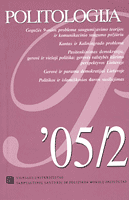Terorizmo ir teroristų psichologiniai ypatumai
Psychological Peculiarities of Terrorism and Terrorists
Author(s): Gintautas ValickasSubject(s): Politics / Political Sciences
Published by: Vilniaus universiteto leidykla & VU Tarptautinių santykių ir politikos mokslų institutas
Keywords: psychological peculiarities of political terrorism; individual characteristics of the terrorists; psychological peculiarities of the terrorist groups; primary data analysis and secondary data sources in psychological study of terrorism; group narcissism
Summary/Abstract: The first part of the article is devoted to the analysis of the psychological peculiarities of political terrorism. Terrorist acts can be taken to be such acts of violence (or a threat to use violence) that aim at intimidating, raising the feeling of helplessness, as well as remove the grounds of/for stability and security, self-trust and trust in the others, interrupt the usual way of life. Usually, the psychological damage of the terrorist activities (discomfort, fear, hatred, mistrust) substantially excels psychical or material damage inflicted (handicapping of the people or destruction of some objects). Sometimes the repercussions of the physical impact can be by no means significant, whereas the psychological harm is the only, or one of the several, evident consequences. (…) In the second part of the article the individual characteristics of the terrorists are analysed. (…) Author claims that the daily life's politicization is by no means "an innocent" process. Politicians and the Government try to ensure that their activities are seen as legitimate. Exactly this is done by means of trying to intervene into what is known as the daily life. (…) In the third part of the article the psychological peculiarities of the terrorist groups are analysed. What unites all the terrorist groups - the blind devotion of its members and loyalty to the objectives ideals the organization pursues. (…) In the end of the article author accentuates the importance of the psychological studies of terrorism, as well as the problems and research directions that arise. Despite the fact that recently the psychological studies of terrorism have begun attracting more and more attention, there is one issue that has for a long time failed to be resolved? there is indeed a lack of the primary data analysis (in this area psychologists until now have managed to generate quite limited information). This fact explains the number of hypotheses that come to see the daylight based on the analysis of separate cases or secondary data sources. In an attempt to research terrorism one must find out what people enter the terrorist groups (or become terrorists loners), what are their principal personal features, what preventive psychological measures should be applied in order to counter the spread of terrorism (or separate people entering the terrorist activities), how can one change the convictions of terrorists, what penalties should be employed against them, etc. Thus, in this area there is a large and responsible work waiting for the psychologists.
Journal: Politologija
- Issue Year: 2003
- Issue No: 1 (29)
- Page Range: 110-131
- Page Count: 22
- Language: Lithuanian

